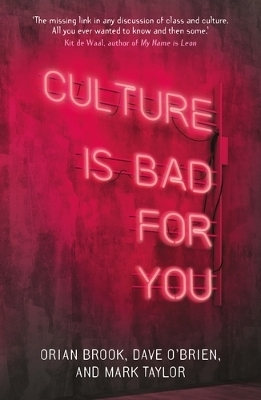
Culture is Bad for You
Inequality in the Cultural and Creative Industries
Seiten
2020
Manchester University Press (Verlag)
978-1-5261-4416-4 (ISBN)
Manchester University Press (Verlag)
978-1-5261-4416-4 (ISBN)
The book demonstrates that cultural jobs are the preserve of the most privileged, a ‘creative class’ in society, and always have been: there was no golden age for social mobility in culture. It shows how women, people of colour, and those of working class origins are missing from key parts of the workforce and audience for culture. -- .
Culture will keep you fit and healthy. Culture will bring communities together. Culture will improve your education. This is the message from governments and arts organisations across the country; however, this book explains why we need to be cautious about culture.
Offering a powerful call to transform the cultural and creative industries, Culture is bad for you examines the intersections between race, class, and gender in the mechanisms of exclusion in cultural occupations. Exclusion from culture begins at an early age, the authors argue, and despite claims by cultural institutions and businesses to hire talented and hardworking individuals, women, people of colour, and those from working-class backgrounds are systematically disbarred.
While the inequalities that characterise both workforce and audience remain unaddressed, the positive contribution culture makes to society can never be fully realised. -- .
Culture will keep you fit and healthy. Culture will bring communities together. Culture will improve your education. This is the message from governments and arts organisations across the country; however, this book explains why we need to be cautious about culture.
Offering a powerful call to transform the cultural and creative industries, Culture is bad for you examines the intersections between race, class, and gender in the mechanisms of exclusion in cultural occupations. Exclusion from culture begins at an early age, the authors argue, and despite claims by cultural institutions and businesses to hire talented and hardworking individuals, women, people of colour, and those from working-class backgrounds are systematically disbarred.
While the inequalities that characterise both workforce and audience remain unaddressed, the positive contribution culture makes to society can never be fully realised. -- .
Orian Brook is an AHRC Creative and Digital Economy Innovation Leadership Fellow at the University of Edinburgh Dave O’Brien is a Professor of Cultural and Creative Industries at the University of Sheffield Mark Taylor is a Senior Lecturer in Quantitative Methods at the University of Sheffield -- .
1 Introduction
2 Is culture good for you?
3 Who works in culture?
4 Who consumes culture?
5 When does inequality begin in cultural workers’ lives?
6 Is it still good work if you’re not getting paid?
7 Was there a golden age?
8 How is inequality experienced?
9 Why don’t women run culture?
10 What about the men?
11 Conclusion
Index -- .
| Erscheinungsdatum | 10.05.2021 |
|---|---|
| Zusatzinfo | 26 black & white illustrations; 5 tables |
| Verlagsort | Manchester |
| Sprache | englisch |
| Maße | 129 x 198 mm |
| Gewicht | 417 g |
| Themenwelt | Sozialwissenschaften ► Soziologie ► Allgemeine Soziologie |
| Sozialwissenschaften ► Soziologie ► Makrosoziologie | |
| Sozialwissenschaften ► Soziologie ► Mikrosoziologie | |
| ISBN-10 | 1-5261-4416-6 / 1526144166 |
| ISBN-13 | 978-1-5261-4416-4 / 9781526144164 |
| Zustand | Neuware |
| Haben Sie eine Frage zum Produkt? |
Mehr entdecken
aus dem Bereich
aus dem Bereich
Buch | Hardcover (2023)
Springer Fachmedien Wiesbaden GmbH (Verlag)
CHF 195,95
Übersetzt von Rudolf Eisler, mit einem aktuellen Geleitwort von …
Buch | Hardcover (2021)
Alfred Kröner Verlag
CHF 16,80


